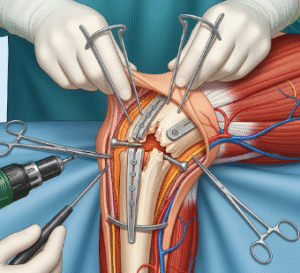Overview
Systemic amyloidosis is a rare but serious condition caused by the abnormal buildup of amyloid proteins in various organs and tissues throughout the body. This buildup disrupts normal organ function, leading to symptoms affecting the heart, kidneys, liver, nervous system, and other organs. Early diagnosis and treatment are crucial to prevent irreversible damage.
What is Systemic Amyloidosis?
Systemic amyloidosis involves the deposition of misfolded amyloid proteins in multiple organs. There are different types of systemic amyloidosis, including:
- AL (light-chain) amyloidosis – caused by abnormal plasma cells producing light chains
- AA (secondary) amyloidosis – associated with chronic inflammatory diseases
- Hereditary amyloidosis – due to genetic mutations
- Wild-type amyloidosis – age-related, mostly affecting the heart
The type determines the treatment approach and prognosis.
Symptoms
Symptoms vary depending on organs involved and amyloid burden but may include:
- Fatigue and weakness
- Unexplained weight loss
- Swelling in legs or abdomen (due to kidney or heart involvement)
- Shortness of breath and irregular heartbeat (cardiac amyloidosis)
- Numbness, tingling, or pain in hands and feet (peripheral neuropathy)
- Enlarged tongue or difficulty swallowing
- Easy bruising or bleeding
- Diarrhea or constipation
Causes
- Abnormal production of amyloid precursor proteins (e.g., light chains in AL amyloidosis)
- Chronic infections or inflammatory diseases (e.g., rheumatoid arthritis) causing AA amyloidosis
- Genetic mutations causing hereditary forms
- Age-related changes leading to wild-type amyloidosis
Risk Factors
- Age over 60 (especially for wild-type amyloidosis)
- Chronic inflammatory or infectious diseases
- Plasma cell disorders such as multiple myeloma
- Family history of hereditary amyloidosis
- Male gender (more commonly affected in some types)
Complications
- Heart failure due to restrictive cardiomyopathy
- Kidney failure requiring dialysis
- Peripheral neuropathy causing disability
- Gastrointestinal complications (malabsorption, bleeding)
- Increased risk of infections
- Death if untreated or diagnosed late
Prevention
- Early treatment and control of underlying inflammatory diseases
- Regular monitoring for patients with plasma cell disorders
- Genetic counseling for hereditary amyloidosis families
- Healthy lifestyle and medical checkups to detect symptoms early
Treatment Options in Korea
Korea provides comprehensive diagnostic and treatment options for systemic amyloidosis at leading medical centers.
- Diagnosis
- Tissue biopsy with Congo red staining to confirm amyloid deposits
- Blood and urine tests to identify amyloid type
- Imaging (echocardiogram, MRI) for organ involvement
- Genetic testing for hereditary forms
- Medical Treatment
- Chemotherapy (e.g., bortezomib-based regimens) for AL amyloidosis
- Treatment of underlying inflammatory conditions in AA amyloidosis
- Tafamidis and other stabilizers for transthyretin amyloidosis
- Supportive care for heart, kidney, and nerve symptoms
- Advanced Therapies
- Autologous stem cell transplantation (in selected AL amyloidosis patients)
- Organ transplantation (kidney, heart) in advanced cases













